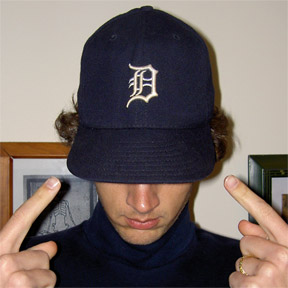Has Freud Really Fallen?
Writer Denyse O'Leary, a specialist in religiously-motivated critiques of established science, has started a new blog, the awkwardly titled Mindful Hack. She had recently teamed with William Dembski on Uncommon Descent, the blogospheric home of Dembski's religiously-motivated attack on evolutionary biology. Her new blog promises the same quality "science journalism" in the realm of neuroscience.
O'Leary's first post is a premature celebration of the "fall" of Sigmund Freud. Creationists love to group Freud, Darwin, and Marx as some imaginary super-team of materialists. According to their logic, Marx and Freud have been discredited, and Darwin will soon join them. Any educated, reasonable person would of course object to this. Darwin is unimpeachable today. Furthermore, although every nominally Marxist country is truly a mess, Karl Marx the political philosopher is by no means discredited. And certainly Sigmund Freud is alive and kicking in the world of psychology. Please read on.
Freud-haters love to point to excesses that have been committed in his name, things like the recovered memory movement, and gleefully declare Freud is dead. The problem is, they are simply wrong. I know plenty of working psychologists, both in hospitals and private practice, who trace their theoretical orientation directly to Freud.
Of course, many of Freud's theories have been changed over time. He even tinkered with his ideas over his lifetime. Personally, I feel like Freud erred in being too explicit in his theories. He really felt like he was coming up with a universal science of the self. Most psychologists now consider things like penis envy to be silly elaborations of Freud's own fixations.
Yet Freud laid the foundation for a theory of personality that has yet to be surpassed. Does anyone really doubt that our emotional reactions to people and situations come from a mess of internal conflicts, some of which we are unaware of at the time? Does anyone doubt that infants approach the world and in particular their parents with a tangle of needs and desires, and that their early experiences with having these desires met or not met create expectations--again, many of which are unconscious--that shape a personality for life? These are contributions from Freud's thinking.
Psychology, practiced as such, is not a science as much as a working philosophy based on a practical understanding of the brain, namely that any process of mind is rooted in the biological brain and what happens to it. Religious people, of course, hate this because it conflicts with their absolutely unsupportable belief in god-given spirit. So, like O'Leary, they latch on to straw-men arguments, blaming Freud for excesses like the satanic-abuse/recovered memories hysteria (which, ironically, was very popular in populations suffering from the god delusion).
I wonder: do religious types have any viable alternative theory about how personalities form and develop? And would those believers in the immaterial spirit really be happy if neuroscience, the real academic challenge to Freud, were to replace social/developmental approaches with a more genetically-based one?


3 comments:
As usual, a very thoughtful post. You are correct to point out that O'Leary is building a strawman argument: as a practicing clinical psychologist, I can assure you that Freud continues to be very influential today. Of course, competing theorists have emerged over time, so Freud no longer occupies the central position in Psychology or Psychiatry that he used to. That does not mean, however, that he has been discredited or is seen as a fallen idol. As with all great scientists or thinkers of yore, his theories have received criticisms and revisions by successors who have the advantage of exposure to diverse cultural paradigms and subsequent developments in social science research that Freud did not.
Still, that does not take away the fact that any mental health practioner worth her salt, whether she be a cognitive-behavioralist, humanist, interpersonalist, existentialist, or eclectic, knows her Freud inside and out. The ideas of the unconscious, intrapsychic conflict between the id, ego, and superego and its resultant defense mechanisms, transference and countertransference for understanding what is happening in a therapy session, and the notion that childhood experiences play an important role in determining personality, continue to be very much alive today.
To blame the repressed memory hysteria on Freud is ill-informed. Although Freud was largely responsible for formulating the concept of repression, he actually took the position—too extreme and dangerously dismissive, in my opinion—that his patients’ reports of childhood sexual involvement with parental figures were for the most part based on fantasy.
The truth is recovered memories, like many human experiences, is messy and not clear cut. While recovered memories can definitely be induced through suggestion and other forms of manipulation, there is also evidence that some recovered memories are real and the result of genuine traumatic experiences that were blocked from awareness for many years. Even Elizabeth Loftus, the memory researcher who is critical of the use of recovered memories as testimony, warns that one should not assume that all recovered memories are false.
I think that Freud will never fall because everyone in Psychology has to start from Freud to continue their own theory.
I think that Freud will never fall because everyone in Psychology has to start from Freud to continue their own theory.
Post a Comment